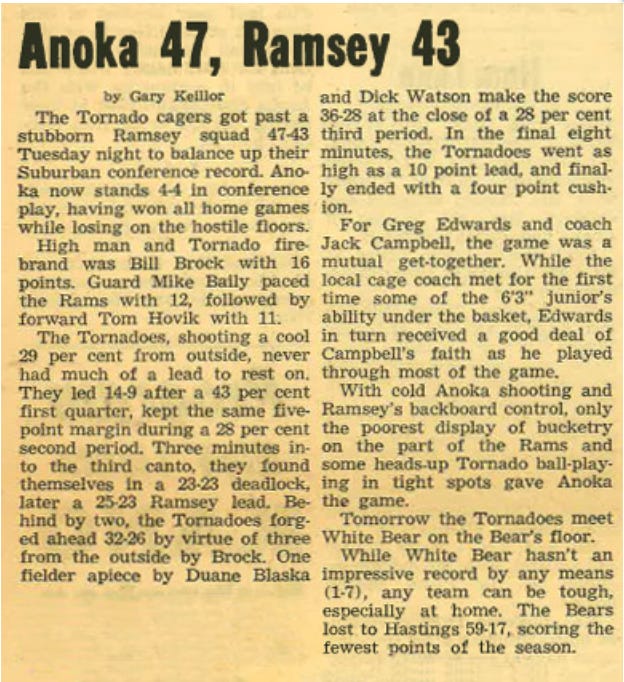I’m confused about the Federalist Society and who originated originalism and the fact that the Founding Fathers were deaf and needed signers to work out the Constitution, women standing in the front of those bewigged guys and waggling their hands (“We the people of the United States”) and getting some words wrong (“in order to form a more perfect Onion”) and in all this waving of bare arms (which they referred to as the “exercise” of free speech) the bare arms got confused with rifles, and I’m sorry but it strikes me as backwardness, the Founders having had no conception of cordless phones or the germ theory of disease or credit cards — they didn’t even know about baseball. James Madison didn’t know a curve from a slider.
And now after brief spring training, the season begins. I plan to camp in the right field bleachers where you can appreciate the heroic ranginess of the outfielders, their instant calculations of the trajectory of a fly ball, the dash, the leap, the miraculous catch, a beautiful piece of geometry in action. There may be three or four of those plays in a game and they’re worth the time spent waiting, and meanwhile I have a notebook with me, I being a writer, and as you near 80, there’s no time to waste.
I prefer simplicity that saves time. I despise French cuffs, the search for cufflinks, the folding of the cuff, the complex insertion of the link in four holes; I prefer a black T-shirt and jeans. So I have turned down lifetime achievement awards because they involve tuxedos and cufflinks and studs and sitting at a dais and listening to speeches. They tried to put me in the Broadcasting Hall of Fame, they offered me the Mark Twain Award, but it involved cufflinks so I said no.
Prizes have taken over literature and the arts and anyone who wins a big prize is forever stuck with the label — “the Pulitzer Prize-winning novelist,” the “Grammy Award-winning songwriter,” as if the decision of five geeks on a committee is the defining moment of your career. The top literary prize is the Nobel, awarded by Swedes, which eliminates any hint of comedy, and so the prize goes every year to morbid writers who create the sort of moribund stuff you should get out of your system by the age of 25.
No, recognition and prizes are a bucket of sheep manure and what counts is the fact that you sit down to your work with enthusiasm even after all these years. Dancers starve themselves, guitarists get carpal tunnel syndrome, actors get old and the roles get smaller and smaller, painters inhale toxic fumes, but we writers are unstoppable. Especially in English.
What a fabulous language. “Don’t cut the branch you’re standing on.” In English, it’s light, somewhat ironic. (Duh.) In German (“Schneiden Sie nicht den Ast, auf dem Sie stehen.”) it’s got a sword and a helmet and leather underwear. And how about “There is a great deal of human nature in everybody.” It says it all.
I began my so-called career when I was 14, writing sports for the Anoka Herald, sitting at an Underwood in the front window of the office of the editor Warren Feist, looking across the street at the Anoka Dairy, trying to make the high school football and basketball teams as heroic as losers can be. I couldn’t play football due to a heart valve problem so I wrote about it but I looked across the street at classmates enjoying ice cream cones, boys talking to girls, some boys clinging to a girl, the swirl of social life all very interesting to me, a fundamentalist kid warned against worldliness, and that’s what I wanted to write about. Football was terribly moralistic, good vs. evil, and the Dairy scene was sensuous, the hand-holding, the arm around the waist, the head against the shoulder.
And now, a lifetime later, this woman leans against me as I write and asks what I’m doing and I read her the first paragraph about the signers and she laughs. How simple life is. If I were a tenor, would she ask me to sing “La donna é mobile”? I very much doubt it. And now she is pulling me upright and leading me off somewhere. I know it’s an odd way to end a column but that’s life. It was never a bad day that had a good evening.
_____________________________________________________________
Count down to book release April 11th
TO PURCHASE: CLICK HERE
Here are the first few pages.












I am not the last man to drive a Model T Ford. My 1910 Model T Ford is in my garage. I am 89 yeatrs of age and I bought that Ford when I was 14. This old Ford runs well. I am in about the same shape as this Ford. When the weather warms up bit, I will crank up the old Ford and this old man will drive it down the road for at least one more time.
I enjoyed reading the piece you wrote when you were 14. Thanks for including it.